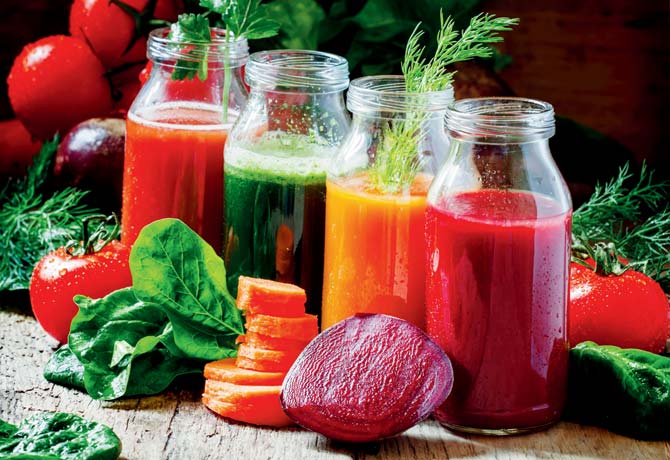Grapefruit cleanse or taco diet? Ditch those bizarre diet plans and opt for a smart and healthy one to detox yourself properly. Experts tell you how to get it right


ADVERTISEMENT
From ancient Egyptians using colonic hydrotherapy and coffee enemas as a means of decongesting bodies, to fasts, grapefruit diets and even the bizarre taco cleanse, where you eat nothing but tortillas for an entire month — there are too many detox diets available at a click of the mouse. But what is a detox all about? “Detoxification is a natural process by which the human body rids itself of toxins. Physiologically speaking, it is the primary biochemical process for removing toxins by converting them into compounds that can be eliminated through urine, sweat, bile or faeces. Our bodies are equipped with a system to eliminate the daily toxins but in this day and age, we are overloaded with toxic compounds — from pollution to pesticides, additives and other chemicals in our food. Detoxification is an important part of health and healing, and it can be supported by diet and lifestyle,” says Dr Eileen Canday, head dietician at Sir HN Reliance Foundation Hospital.
Consultant nutritionist Niti Desai adds, “We discourage people from following detox plans as they are short-term measures. The right way is to eat healthy and balanced foods in moderation.”
Consultant nutritionist Charmaine D’Souza, whose high-profile client roster includes Anil Ambani, shares, “There is no scientifically proven way to totally eliminate toxins from the body simply by going on a juice fast for a couple of days. Our kidneys, liver, lungs and skin help in the elimination of toxins on a daily basis. However, there are ways to help these organs work better.”
Going on a detox? Here’s your checklist
Dos
>> Consult your healthcare provider or general physician before you start. “What works for one individual may be harmful for another. For example, celery juice is an excellent diuretic and can reduce oedema but people with low blood pressure should not consume it. Avoid excessive feasting followed by strict fasting because it can be detrimental to your health,” says D’Souza.
>> Eat fresh fruits and vegetables. Include nuts and seeds in your diet. “Remove excessive refined sugars, trans and saturated fats from your diet. Replace them with foods containing fibre, flavonoids, and antioxidants along with lifestyle modalities that support the body’s healing potential,” adds Canday.
>> Drink plenty of water whenever you feel dehydrated
>> Incorporate light exercises.
Don’ts
>> Avoid detoxification plans for long periods of time. “Intensive long-term detox can lead to hair fall, muscle wasting and rebound weight gain,” warns Desai.
>> Dependence on diuretics and laxatives can be harmful.
>> Stop continuing a detox plan if you are feeling unwell.
>> Avoid reducing food intake below 1000 calories per day.

Want to kick-start your metabolism? Try the simple two-day plan
After waking up: A cup of green tea or jasmine tea infused with two cloves.
Breakfast: Smoothie cleanse made from flaxseed powder (one tablespoon), one carrot, two deseeded tomatoes, 20 spinach leaves, 20 mint leaves, five tulsi leaves, wheat grass juice (50 ml), lemon juice (50 ml) and water (100 ml).
Lunch: Smoothie cleanse made from coconut water (200 ml), a bowl of finely chopped fresh coriander, one cucumber, bottle gourd (50 gms), beetroot (50 gms), coconut oil (one tablespoon) and ginger juice (two tablespoons).
Mid-evening: A cup of green tea with a small serving of pineapple or papaya.
Dinner: Smoothie cleanse made from soy milk (100 ml), one avocado, one apple, sesame oil (one tablespoon), alfalfa powder (one tablespoon), pepper powder (one-fourth teaspoon) and turmeric powder (one-fourth teaspoon).
Through the day: Drink a minimum of 2.5 litres of water infused with one deseeded lemon.
Information courtesy: Charmaine D’Souza NOTE: Avoid the plan if you are on medication

Bust the myths
Myth 1: It’s cool to binge because there’s always a detox.
“A detox cannot help repair the damage. It can only prevent further damage. Also, a detox diet doesn’t remove all the toxins from your body,” says Desai.
Myth 2: Detox helps lose weight
“It can’t help you lose weight permanently. It is important to exercise even when you are on a detox plan to avoid losing muscle. Your exercise regime may not be as hardcore as on regular days but it is better to do some light cardiovascular activity than to do nothing at all,” says D’Souza.
Myth 3: Water is the best way to cleanse
While it’s important to stay hydrated, drinking excessive amounts of water can have harmful side effects when on a detox plan. “You will urinate a lot more than required, and lose out on essential salts and minerals, leading to fatigue, headaches, nausea and low blood pressure,” cautions D’Souza.
Myth 4: Anyone can follow a detox plan
“Someone, who is tested for bioaccumulation of specific toxins, like mercury, lead or other kinds of substance, needs a detox diet for a certain period of time with retesting. It could also be required when there’s evidence of hormonal disruption,” shares Canday. Pregnant women or those on their period, teens, older adults and people with comorbidities like diabetes and kidney disease should avoid taking up detox plans.
 Subscribe today by clicking the link and stay updated with the latest news!" Click here!
Subscribe today by clicking the link and stay updated with the latest news!" Click here!






